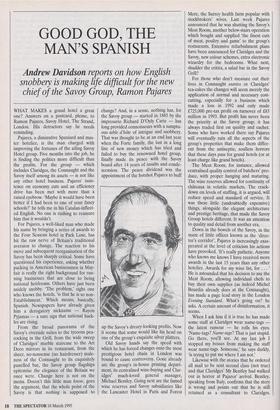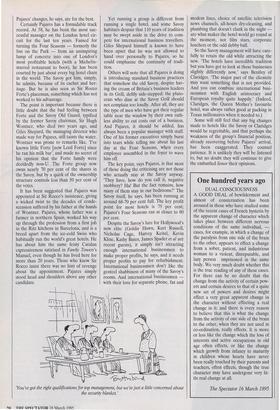GOOD GOD, THE MAN'S SPANISH
Andrew Davidson reports on how English snobbery is making life difficult for the new chief of the Savoy Group, Ramon Pajares
WHAT MAKES a grand hotel a great one? Answers on a postcard, please, to Ramon Pajares, Savoy Hotel, The Strand, London. His detractors say he needs reminding.
Pajares, a diminutive Spaniard and mas- ter hotelier, is the man charged with improving the fortunes of the ailing Savoy Hotel group. Five months into the job, he is finding the politics more difficult than the profits. For the group — which includes Claridges, the Connaught and the Savoy itself among its assets — is not like any other hotel business. Pajares' insis- tence on economy cuts and an efficiency drive has been met with more than a raised eyebrow. 'Maybe it would have been better if I had been to one of your fancy schools?' he tells me in his Catalan-inflect- ed English. No one is rushing to reassure him that it wouldn't.
For Pajares, a well-liked man who made his name by bringing a series of awards to the Four Seasons hotel in Park Lane, has hit the raw nerve of Britain's traditional aversion to change. The reaction to his move and subsequent reorganisation of the Savoy has been sharply critical. Some have questioned his experience, asking whether packing in American businessmen in May- fair is really the right background for run- ning businesses that are close to being national heirlooms. Others have just been snidely snobby. 'The problem,' sighs one who knows the hotels, Is that he is so non- Establishment.' Which means, basically, Spanish. Newspapers have already given him a derogatory nickname — Rayon Pyjamas — a sure sign that national hack- les are rising.
From the broad panorama of the Savoy's riverside suites to the tycoons pea- cocking in the Grill, from the wide sweep of Claridges' marble staircase to the Art Deco mirrors in its restaurant, from the sheer, no-nonsense (no hairdresser) male- ness of the Connaught to its exquisitely panelled bar, the Savoy group flagships epitomise the elegance of the Britain we once were. Change here is not on the menu. Doesn't this little man know, goes the argument, that the whole point of the Savoy is that nothing is supposed to change? And, in a sense, nothing has, for the Savoy group — started in 1885 by the impresario Richard D'Oyly Carte — has long provided connoisseurs with a sumptu- ous table d'hôte of intrigue and snobbery. That was thought to be at an end last year when the Forte family, the last in a long line of new money which has tfied and failed to buy the renowned hotel group, finally made its peace with the Savoy board after 14 years of insults and conde- scension. The peace dividend was the appointment of the hotshot Pajares to buff up the Savoy's dreary-looking profits. Now it seems that some would like his head on one of the group's exquisite silver platters.
Old Savoy hands say the speed with which he has forced changes onto the most prestigious hotel chain in London was bound to cause controversy. Gone already are the group's in-house printing depart- ment, its centralised wine-buying and Clar- idges' much-loved general manager, Michael Bentley. Going next are the famed wine reserves and Savoy subsidiaries like the Lancaster Hotel in Paris and Forest Mere, the Surrey health farm popular with stockbrokers' wives. Last week Pajares announced that he was shutting the Savoy's Meat Room, another below-stairs operation which bought and supplied 'the finest cuts of meat, poultry and game' to the group's restaurants. Extensive refurbishment plans have been announced for Claridges and the Savoy, new colour schemes, extra electronic wizardry for the bedrooms. What next, shudder the critics, a salad bar in the Savoy Grill?
For those who don't measure out their lives in Connaught entrées or Claridges' tea-cakes the changes will seem merely the application of normal and necessary cost- cutting, especially for a business which made a loss in 1992 and only made £725,000 pre-tax profit on turnover of £83 million in 1993. But profit has never been the priority at the Savoy group; it has always traded first on quality and cachet. Some who have worked there say Pajares will eventually ruin all the aspects of the group's properties that make them differ- ent from the antiseptic, soulless horrors that these days pass for grand hotels (or at least charge like grand hotels).
The Meat Room, for instance, allowed centralised quality control of butchers' pro- duce, with proper hanging and maturing. The wine reserves allowed for continuity of châteaux in volatile markets. The crack- down on levels of staffing, it is argued, will reduce speed and standard of service. It was these little (undoubtedly expensive) things, alongside the elegant architecture and prestige heritage, that made the Savoy Group hotels different. It was an attention to quality and detail from another era.
Down in the bowels of the Savoy, in the maze of little offices known as the 'direc- tor's corridor', Pajares is increasingly exas- perated at the level of criticism his actions have provoked. 'It's really pathetic. Anyone who knows me knows I have received more awards in the last 15 years than any other hotelier. Awards for my wine list, for . . . He is astounded that his decision to axe the Meat Room, allowing individual chefs to buy their own supplies (as indeed Michel Bourdin already does at the Connaught), has made a page lead story in the London Evening Standard. What's going on? he asks. A certain amount of disinformation, it seems.
When I ask him if it is true he has made some staff at Claridges wear name-tags the latest rumour — he rolls his eyes. `Name-tags? Name-tags? That is just stupid. Go there, you'll see. At my last job I stopped my bosses from making the staff wear name-tags. Someone,' he says darkly, `is trying to put me where I am not.'
Likewise with the stories that he ordered all mail to be sent second class (not true) and that Claridges' Mr Bentley had walked out in horror at Pajares' arrival. Bentley, speaking from Italy, confirms that the story is wrong and points out that he is still retained as a consultant to Claridges. Pajares' changes, he says, are for the best.
Certainly Pajares has a formidable track record. At 58, he has been the most suc- cessful manager on the London hotel cir- cuit for the last ten years. Famed for turning the Four Seasons — formerly the Inn on the Park — from an uninspiring lump of concrete into one of London's most profitable hotels (with a Michelin- starred restaurant to boot), he has been courted by just about every big hotel chain in the world. The Savoy got him, simply, he admits, because of its cachet and her- itage. But he is also seen as Sir Rocco Forte's placeman, something which has not worked to his advantage.
The point is important because there is little doubt that the bad feeling between Forte and the Savoy Old Guard, typified by the former Savoy chairman, Sir Hugh Wontner, who died two years ago, and Giles Shepard, the managing director who made way for Pajares, still taints the water. Wontner was prone to remarks like, 'I've known little Forte [now Lord Forte] since he ran his milk bar', and made no secret of his opinion that the Forte family were decidedly non-U. The Forte group now owns nearly 70 per cent of the shares in the Savoy, but by a quirk of the ownership structure controls less than 50 per cent of the votes.
It has been suggested that Pajares was appointed at Sir Rocco's insistence, giving a wicked twist to the decades of conde- scension suffered by his father at the hands of Wontner. Pajares, whose father was a farmer in northern Spain, worked his way up through the profession from a first job in the Ritz kitchens in Barcelona, and is a breed apart from the ice-cold Swiss who habitually run the world's great hotels. He has about him the same feisty Catalan expressiveness satirised in Fawhy Towers's Manuel, even though he has lived here for more than 20 years. Those who know Sir Rocco insist there was no hint of revenge about the appointment. Pajares simply stood head and shoulders above any other candidate. Yet running a group is different from running a single hotel, and some Savoy habitues despair that 110 years of tradition may be swept aside in the drive to com- pete for international business travellers. Giles Shepard himself is known to have been upset that he was not allowed to hand over personally to Pajares, so he could emphasise the continuity of tradi- tion.
Others will note that all Pajares is doing is introducing standard business practices that somehow the old Savoy, despite hav- ing the cream of Britain's business leaders in its Grill, deftly side-stepped: the pluto- crats who dine at the Savoy Grill should not complain too loudly. After all, they are the type of men who have got their regular table near the window by their own ruth- less ability to cut costs out of a business. And Pajares, it should be added, has always been a popular manager with staff. One of his former executives simply burst into tears while telling me about his last day at the Four Seasons, when every employee assembled in the foyer to wave him off.
The key point, says Pajares, is that most of those doing the criticising are not those who actually stay at the Savoy anyway. 'They have, how do you call it, negative snobbery? Ha! But the fact remains, how many of them stay in our bedrooms?' The Savoy itself, he says, has been running at around 68-70 per cent full. The key profit point for most hotels is 75 per cent; Pajares's Four Seasons ran at closer to 80 per cent.
Despite the Savoy's lure for Hollywood's new elite (Goldie Hawn, Kurt Russell, Nicholas Cage, Harvey Keitel, Kevin Kline, Kathy Bates, James Spader et al are recent guests), it simply isn't attracting enough international businessmen to make proper profits, he says, and it needs proper profits to pay for refurbishment. International businessmen don't like the genteel shabbiness of many of the Savoy's rooms. And international businessmen with their love for separate phone, fax and `You've got the right qualifications for top management, but we're just a little concerned about the security blanket.' modem lines, choice of satellite television news channels, all-hours dry-cleaning, and plumbing that doesn't clank in the night — are what makes the hotel world go round at the moment, not film stars, corporate lunchers or the odd debby ball.
So the Savoy management will have care- fully to retain the old while attracting the new. 'The hotels have incredible tradition but you have got to look at these businesses slightly differently now,' says Bentley of Claridges. 'The major part of the clientele may want something that is not provided. And you can combine international busi- nessmen with English aristocracy and European royalty quite happily.' (Indeed, Claridges, the Queen Mother's favourite hotel, was always rather good at packing in Texan millionaires when it needed to.) Some will still feel that any big changes made to hotels like the Savoy or Claridges would be regrettable, and that perhaps the weakness of the group's financial position, already recovering before Pajares' arrival, has been exaggerated. They counsel patience. It is unlikely they will be listened to, but no doubt they will continue to give the embattled Senor their opinions.



























































 Previous page
Previous page